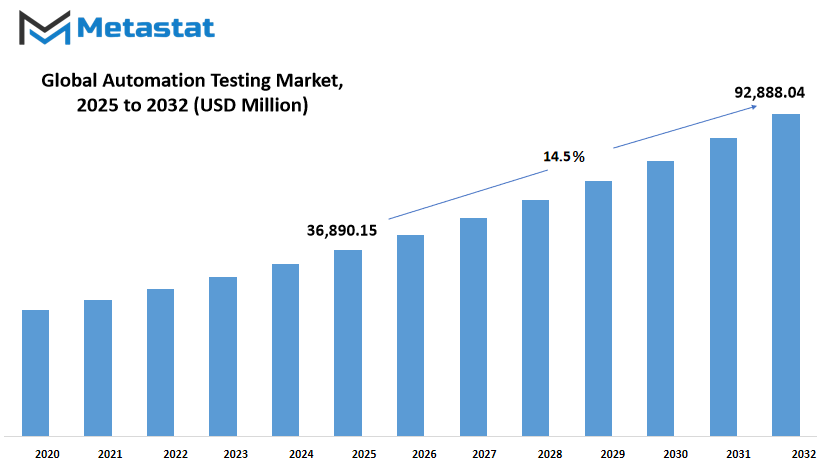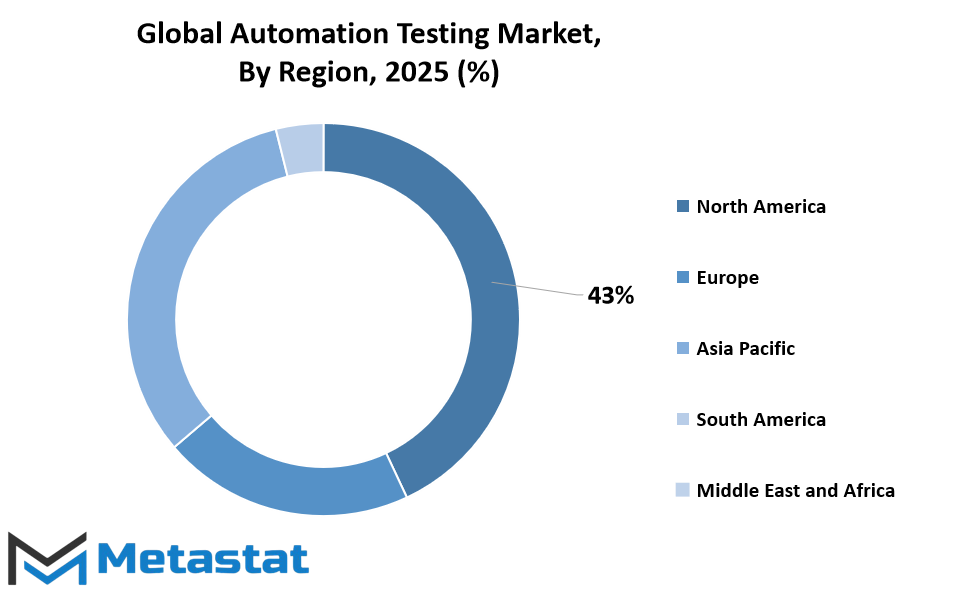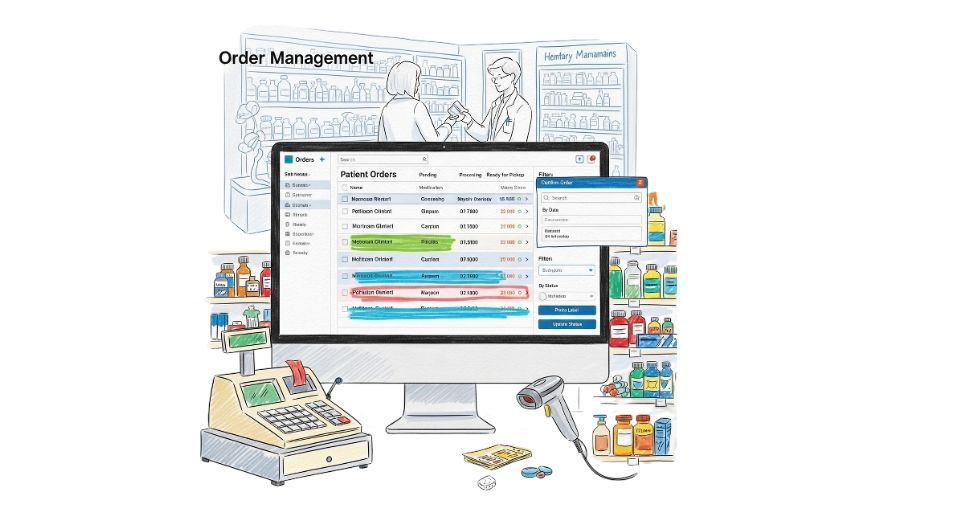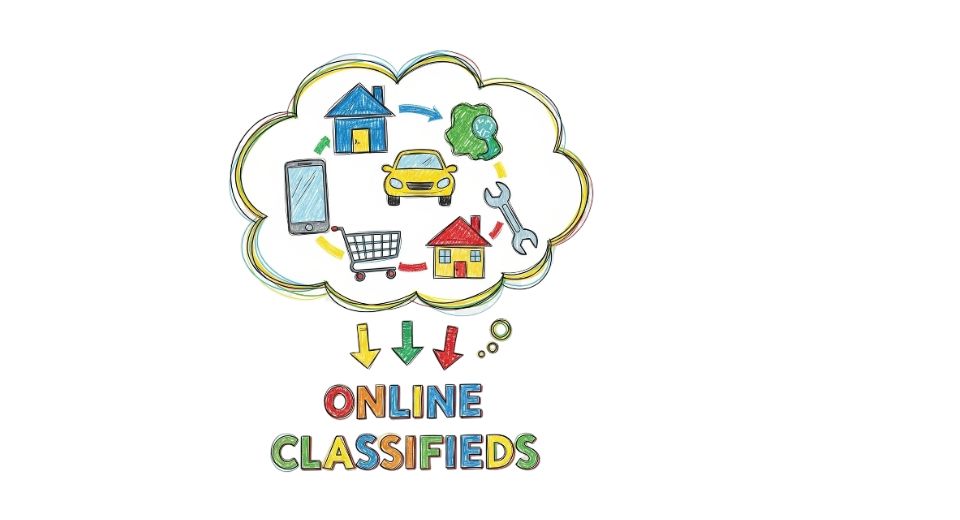MARKET OVERVIEW
The global automation testing market in the software and technology industry will increasingly determine how organizations ensure the reliability and quality of digital products. With companies heading toward more complex digital environments, the market will be becoming a necessity and not an option. Automation testing, technologically oriented in its nature at its core, will be a strategic activity to facilitate the release of software faster and better without compromising on standards. It will not only support development cycles but will become an integral part of continuous delivery practices, driving decisions from the initial stages of code development through to post-release analysis.
While classical manual testing will forever be at the mercy of time and human capabilities, automated platforms will give reproducibility of consistent nature and broad coverage. The global automation testing market will not just cover functionality testing but will also handle aspects like performance, user interface responsiveness, and integration consistency between platforms. This is particularly vital for industries dealing with large-scale users or complex transactions, such as finance, health care, and telecommunication. Automation testing stands out in the sense that it is agile it will evolve as software architecture evolves, from monolithic applications to microservices and serverless functions. The market for this business will not be confined to traditional test script tools.
Instead, it will be attracted towards systems that are capable of learning from updates in the code and past patterns of tests. As machine learning and artificial intelligence technologies improve, they will become part of automation tools to predict failure points and automate testing cycles. Still, it is important to acknowledge that the global automation testing market will not solely be dependent on such developments. Its success will have its roots in test environments under control, good integration pipelines, and human monitoring to ensure automation stays on course. Beyond the capabilities of this market is the purely creative portion of quality assurance, where human judgment must be applied to define subjective aspects of a digital experience. No automated tool can fully substitute for those testers who understand user behavior in its subtleties.
Similarly, complexities involving user emotions, ambiguous workflows, or rich cultural interfaces will require human evaluation. The global automation testing market will not aim to erase the need for manual testing entirely, but will allow it to focus where it matters on exploration, innovation, and experience-based testing. In the future, companies will not think of automation as an initial setup. It will be an ongoing practice that will require constant updates, maintenance, and deliberate design. The market will continue to grow in terms of size as well as depth but will be largely dependent on collaboration between software engineers, QA engineers, and operations teams. Automation will become progressively nearer to the beginning of the development cycle with requiring earlier investments and mindset shifts in stakeholders. Lastly, the global automation testing market will no longer just support product releases it will redefine how quality is met in a world that will not relent. With evolving user expectations and increasingly accelerated development cycles, this market will become the unseen catalyst for the majority of most reliable digital experiences.
Global automation testing market is estimated to reach $92,888.04 Million by 2032; growing at a CAGR of 14.5% from 2025 to 2032.

GROWTH FACTORS
The global automation testing market will continue to grow as more companies shift towards faster, more efficient ways of developing and releasing software. Businesses today want quick results, and automation helps in speeding up the testing process without losing accuracy. This push for speed, along with the rising use of mobile applications and cloud computing, will keep driving the market forward. More organizations are realizing that manual testing takes time, and it can delay updates or releases. Automation, on the other hand, helps them test more frequently, catch bugs early, and improve the quality of their products.
In the coming years, artificial intelligence and machine learning will play a larger role in how testing is done. These technologies will help predict issues before they even appear, making testing smarter and more reliable. As tools get better at learning patterns and identifying risks, businesses will be able to act faster and fix problems before they reach customers. This change will not only improve performance but also help companies stay ahead of their competitors. Additionally, the growing need for continuous testing in DevOps practices is another reason this market will expand. Many companies are moving towards a model where testing happens throughout the development cycle, not just at the end.
However, the global automation testing market might face some challenges. One of the main issues is the high cost of setting up automated systems. Small and medium-sized companies might struggle to afford the tools and talent needed. Also, a lack of skilled professionals who understand how to use these systems can slow down adoption. If businesses can’t find or train enough qualified people, they may not see the full benefits of automation.
Despite these hurdles, there are still promising opportunities ahead. The rising demand for smart devices and the use of connected technology in various industries will push the need for better testing solutions. As more devices get connected, the systems behind them will become more complex, and automated testing will be crucial to keep everything running smoothly. Companies that invest in modern tools and train their teams properly will likely see strong returns. In the future, automation testing will be a key part of how software is built, checked, and delivered. The market will keep evolving as tools become more affordable and easier to use, opening new doors for businesses of all sizes.
MARKET SEGMENTATION
By Testing Type
The global automation testing market is growing steadily, driven by the ongoing demand for faster and more efficient software development. As companies continue to rely on digital solutions, the need for automated testing tools becomes more important than ever. This market is shaped by advancements in technology and the constant push to improve software quality while reducing development time and costs. In the future, automation testing will no longer be a choice but a basic requirement for businesses that aim to stay competitive in a fast-paced environment. It will help them release products quickly without sacrificing quality or performance.
Looking ahead, the market is expected to expand with improvements in testing tools that are more user-friendly and capable of handling complex applications. By Testing Type, the market is divided into Static Testing and Dynamic Testing. Static Testing focuses on identifying issues without running the code. It allows developers to check the structure, spelling, and format of their code early in the process. This method can reduce the number of errors found later, which saves both time and money. Dynamic Testing, on the other hand, is done by executing the code and observing its behavior. It helps find bugs that appear only when the software is running, which makes it a necessary step before any product launch. Both types are vital, and the future will likely see smarter tools that combine these methods in a more seamless way.
New tools powered by artificial intelligence will change how tests are written and maintained. These tools will learn from previous test runs and predict where future errors might occur. They will reduce the need for manual updates and allow testers to focus on more critical areas. The demand for skilled testers will also grow, but their roles will shift toward guiding the tools rather than doing everything by hand. Businesses will invest in training and development to help their teams adapt.
In years to come, the global automation testing market will see more partnerships between companies and technology providers. These collaborations will aim to create solutions that are not only more accurate but also easier to integrate into existing systems. As the use of mobile apps, cloud-based systems, and Internet of Things devices continues to increase, the need for flexible and scalable testing tools will follow. This market is heading toward a future where testing becomes a natural part of the software lifecycle, improving not just speed, but also the user experience and reliability of digital products.
By Service
The global automation testing market is heading toward a future where technology will shape how businesses test and improve their digital tools. As companies continue to rely more on software for daily operations, the need for fast and accurate testing is becoming even more important. Automation testing helps by cutting down the time needed for checking software, reducing errors, and making sure updates work as planned. Instead of doing everything manually, which can be slow and unreliable, businesses are now moving towards automated systems that can handle repetitive tasks quickly and without mistakes. This shift is not just about saving time it’s about staying competitive and making sure systems work well under all conditions.
When we look at the market based on services, it is mainly split into Managed Services and Professional Services. Managed Services allow businesses to hand over the responsibility of testing to experts who take care of everything from planning to execution. This is especially helpful for companies that don’t have enough in-house resources or want to focus on their main work instead. These services offer ongoing support and often use cloud platforms and advanced tools to carry out tests efficiently. On the other hand, Professional Services are more focused on specific needs. They offer expert help in areas like setting up automation frameworks, advising on best practices, or training internal teams. These services are often chosen for short-term projects or when a company needs special skills to improve its current testing setup.
Looking ahead, the demand for both Managed and Professional Services will grow. With more focus on digital transformation, businesses will need strong testing solutions to keep up with fast development cycles. Artificial intelligence and machine learning will also play a big role in this space, helping tools become smarter by learning from past test results. This will allow automation testing systems to predict where bugs might appear and fix them before they cause problems. Also, as more devices get connected, especially in industries like healthcare and transport, testing will need to cover more ground, which will push the market even further.
In the coming years, the global automation testing market will continue to expand as companies look for reliable ways to improve quality and speed. With Managed and Professional Services offering flexibility and deep expertise, more businesses will turn to these options to meet their goals and stay ahead in the digital world.
By Interface
The global automation testing market is growing steadily as more businesses look for faster and more efficient ways to check the quality of their software. This shift is driven by the need to deliver reliable digital products in less time, without sacrificing accuracy. As technology continues to grow, the demand for automation testing will only increase. In the coming years, it will become a core part of how organizations ensure their software works as expected. One of the main reasons this market is gaining attention is because it reduces the time spent on manual testing and allows teams to focus on improving user experience.
Looking ahead, the future of the global automation testing market will likely be shaped by the use of different interfaces. These include desktop testing, web testing, mobile testing, and test design. Desktop testing will continue to be important for businesses that rely on traditional systems. Even though more users are moving to web and mobile platforms, there are still many industries where desktop software is critical. Automation tools for this type of testing are improving and will help companies save time and reduce errors in their older systems.
Web testing, on the other hand, is becoming more important every year. With so many services available online, companies need to make sure their websites work well across different browsers and devices. Automation testing tools are being developed to keep up with this demand, offering faster ways to check how websites respond to different user actions. As more people turn to online platforms for their needs, this part of the market will grow even more.
Mobile testing is also expected to see major growth. With smartphones and tablets being used by billions of people, it’s important that apps work smoothly and without problems. Automation testing for mobile apps will help businesses detect bugs earlier and provide better experiences for users. As more features are added to mobile devices, testing will need to be just as advanced.
Lastly, test design is a key part of the process. It involves planning how testing should be done before any tool is used. Good test design makes automation more effective by making sure tests are accurate and useful. In the future, smarter tools will help teams create better tests faster, making the whole process smoother.
Altogether, the global automation testing market will keep growing as new tools, methods, and needs emerge. It will remain an important part of how technology continues to improve in our everyday lives.
By Vertical
The global automation testing market is expected to see steady growth in the coming years as businesses continue to focus on speed, accuracy, and cost-efficiency. Automation testing allows companies to test software faster and with fewer errors, which helps them release updates more often and with better performance. This becomes especially important as industries increasingly depend on software to manage daily operations and customer experiences. With time, the demand for such testing solutions will only grow, especially in sectors that rely on technology to stay competitive.
Looking ahead, different industries will shape the direction of the global automation testing market based on their unique needs. In the banking and financial services industry (BFSI), security and accuracy are top priorities. Automated testing will help these institutions maintain secure systems, protect customer data, and follow strict regulations. IT and Telecom companies will depend on automation to quickly roll out new features and updates. As more people rely on smartphones, apps, and cloud services, there will be a greater need for testing tools that can keep up with this pace.
Manufacturing companies will also benefit as more factories use smart technology and connected devices. Automation testing will help make sure that software running machines and systems works without fail, which will reduce downtime and increase safety. In the retail sector, companies will turn to automation to test customer-facing systems like websites and mobile apps. This will help provide smooth shopping experiences and reduce errors in payment and product management systems.
Healthcare will rely on testing tools to support systems that manage patient data, appointment scheduling, and remote care. Automated testing will help ensure that medical software is accurate and safe, especially when it supports decision-making or stores sensitive information. Government organizations will also use automated testing to improve the performance of public services and secure important records and digital platforms.
Other sectors such as education, logistics, and energy will also contribute to the future of this market as they adopt digital solutions. As more industries embrace automation, the global automation testing market will continue to grow. It will support faster innovation, improved system stability, and greater customer satisfaction. The future will likely bring smarter and more adaptive testing tools that will help companies of all sizes deliver better software and services with confidence.
|
Forecast Period |
2025-2032 |
|
Market Size in 2025 |
$36,890.15 million |
|
Market Size by 2032 |
$92,888.04 Million |
|
Growth Rate from 2025 to 2032 |
14.5% |
|
Base Year |
2024 |
|
Regions Covered |
North America, Europe, Asia-Pacific Green, South America, Middle East & Africa |
REGIONAL ANALYSIS
As the demand for digital solutions continues to rise, the global automation testing market is expected to play a much bigger role across various regions in the coming years. The increasing need for quality assurance and faster delivery in software development will continue to push industries toward adopting automated testing methods. Looking at the global landscape, this market is divided based on geography, allowing us to better understand how different regions are embracing the change.
In North America, which includes the U.S., Canada, and Mexico, the automation testing industry is already growing at a steady pace. The U.S., with its strong focus on technology and innovation, will likely continue leading in adopting new testing tools and methods. Canada and Mexico are not far behind, with more companies beginning to understand the cost and time benefits of automation. As industries grow and become more digitally focused, these countries are expected to increase their investment in such technologies.
Europe is made up of the UK, Germany, France, Italy, and the Rest of Europe. This region has shown a consistent interest in improving its software systems. Germany and the UK are especially active in using automated processes to reduce human error and boost accuracy. As digital transformation expands across sectors like healthcare, manufacturing, and finance, more European countries are expected to follow suit, driving further demand for advanced testing tools.
Asia-Pacific includes countries like India, China, Japan, South Korea, and others. This region holds significant growth potential due to the fast-paced development of IT services and digital platforms. India and China, being major outsourcing hubs, are investing in automated systems to speed up service delivery without compromising on quality. Japan and South Korea, known for their tech innovation, are likely to explore more advanced automation solutions in the near future.
South America, covering Brazil, Argentina, and other countries in the region, is gradually catching up. While automation testing is still in the early stages for many businesses here, growing awareness and the need for competitive software products are likely to drive adoption. Similarly, in the Middle East & Africa, which includes GCC Countries, Egypt, South Africa, and others, industries are beginning to explore automation as a way to improve efficiency and cut down on testing time.
In the years to come, each of these regions will continue to shape the growth of the global automation testing market in unique ways, influenced by their pace of digital growth and willingness to adopt new technologies.

COMPETITIVE PLAYERS
The global automation testing market is gradually shaping the future of how software is developed and maintained. As businesses look for faster and more reliable ways to ensure quality, the need for automation in testing continues to grow. This growth is driven by the increasing demand for efficient software development, especially in sectors like finance, healthcare, and retail, where performance and security matter most. Automation testing helps save time, reduces errors, and allows developers to focus on innovation. As industries embrace digital transformation, testing tools that support quick feedback and smooth integration into development cycles are becoming more essential than ever.
Looking ahead, the role of leading players in the global automation testing market will become even more important. Companies like IBM Corporation, OpenText, Capgemini, QA Mentor, Inc., and Tricentis are shaping the direction of automation through their tools, platforms, and services. These players are investing in smart solutions that make testing smarter and more adaptive. Tools developed by Codoid, Cigniti Technologies, and Keysight Technologies are already making it easier for teams to run large numbers of tests across different platforms. Infosys and Wipro are pushing forward with strong service offerings that support clients around the world. BugRaptors, QAble, HCL Technologies, Sauce Labs, and Parasoft are also building competitive testing environments that help speed up software delivery without cutting corners on quality.
In the future, competition among these companies will likely increase, especially as artificial intelligence and machine learning become a bigger part of automation testing. These technologies will help reduce manual effort even further, predict where problems might occur, and adjust test cases automatically. As a result, companies that offer flexible, easy-to-use tools with strong support systems will stand out more. The global automation testing market will also see more partnerships between service providers and tech companies as they aim to deliver faster and better solutions to their clients. The focus will shift towards tools that are not only powerful but also simple to use, especially for teams working in fast-paced development settings.
While price, performance, and support will continue to influence buyers’ decisions, future market leaders will be those who can combine all three with constant innovation. Companies that adapt quickly and provide scalable solutions for both large and small businesses will set the standard. The global automation testing market will not just grow it will change how businesses approach quality, speed, and reliability in the digital world.
Automation Testing Market Key Segments:
By Testing Type
- Static Testing
- Dynamic Testing
By Service
- Managed Services
- Professional Services
By Interface
- Desktop Testing
- Web Testing
- Mobile Testing
- Test Design
By Vertical
- BFSI
- IT & Telecom
- Manufacturing
- Retail
- Healthcare
- Government
- Others
Key Global Automation Testing Industry Players
- IBM Corporation
- OpenText
- Capgemini
- QA Mentor, Inc.
- Tricentis
- Codoid
- Cigniti Technologies
- Keysight Technologies
- Infosys
- Wipro
- BugRaptors
- QAble
- HCL Technologies
- Sauce Labs
- Parasoft
WHAT REPORT PROVIDES
- Full in-depth analysis of the parent Industry
- Important changes in market and its dynamics
- Segmentation details of the market
- Former, on-going, and projected market analysis in terms of volume and value
- Assessment of niche industry developments
- Market share analysis
- Key strategies of major players
- Emerging segments and regional growth potential








 US: +1 3023308252
US: +1 3023308252






